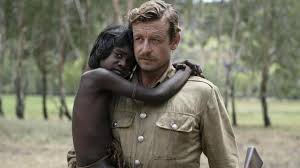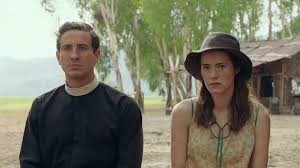Satisfying Australian western with a difference.
Set around a century ago in Aboriginal land in the North of Australia, it tells the tale of an Aboriginal boy whose family is killed by a platoon of trigger-happy white soldiers and ends up being brought up by a pastor and his wife who are trying to sustain a mission in the bush.
12 years later, his uncle Baywara (Sean Mununggurr) is out for revenge and apart from attacking other white settlers’ stations, he also wants to get those members of the platoon still around.
Gutjuk (Jacob Junior Nayinggul) is now a young man and is inevitably drawn into the conflict, first being used by the whites to draw out Baywara and then being welcomed back into his local family.
What follows is a combination of Western and thriller as we see whether the aboriginal knowledge of land and nature can stand up to the White man’s firepower and ´control´.
It is a very well-made film by Stephen Maxwell Johnson that apparently took years to set up as they requested local permission to use the land in the Kakadu region of the Northern Territories and employed local non-actors as cast.
I found the treatment of a largely simple story compelling and enjoyed the complicated relationship between the whites as well.
Jack Thompson appears as the head honcho,
Simon Baker as Travis makes for an intriguing sort of conscience among the whites and Callan Mulvey convinces as the bad guy.
Caren Pistorius does a good job as the pastor’s wife. Among the locals Witiyana Marika as the grandfather and Esmeralda Marimowa as a wild Amazon fighter shine.
The script by Chris Anastassiades may seem a little modern and slightly obvious in terms of the message he wishes to convey but it includes some very good scenes. Camerawork by Andrew Commis is excellent and a feature of the film is the use of birdsong and animal sounds throughout.
A very beautifully presented film with a historical punch and plenty of relevance for today. It may not be an epic but it does tick most of the boxes.
4 stars plus


















































































